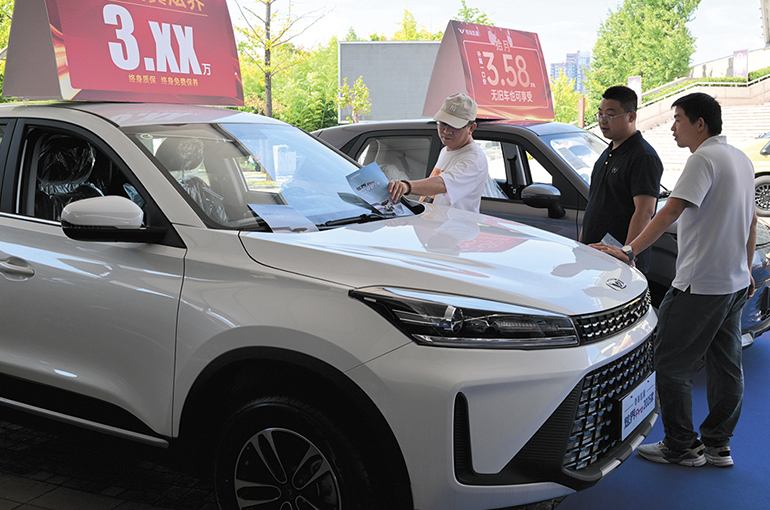(Yicai) Oct. 13 — China’s production, sales, and exports of passenger cars reached new record highs for the fifth consecutive month in September, driven by a consumption boom due to the expiring tax exemptions on auto purchases, new model launches, and national and local government subsidies.
Passenger car output surged over 17 percent to 2.838 million units last month from a year earlier, surpassing the previous September record of 2.44 million units set in 2023, according to data released by the China Passenger Car Association today.
Retail sales of passenger cars rose 6.3 percent to 2.241 million units in the period, with wholesale sales climbing more than 12 percent to 2.803 million units, the CPCA data also showed. Despite setting new records, both growth rates slowed compared to August.
Among them, retail sales of Chinese-branded vehicles surged 13 percent to 1.5 million units last month from a year earlier, accounting for 67 percent of the total. German and Japanese brands saw their market share shrink to 14.3 percent and 11.6 percent from 16.6 percent and 12.7 percent, respectively, while US brands had their share expand to 5.8 percent from 5.7 percent.
In terms of car types, retail sales of luxury vehicles fell 1 percent to 240,000 units, accounting for 10.8 percent of the total, a decline from 11.6 percent in the period. Among them, German luxury carmakers are facing tremendous pressure, mainly because of the rapid development of Chinese competitors in this market segment.
BMW’s China sales fell 0.4 percent to 147,000 units in the third quarter from a year earlier. Sales in the country of Mercedes-Benz and Porsche plunged 27 percent and 21 percent to 125,000 units and 11,000 units, respectively.
Chinese high-end electric vehicles are not only for driving but also for leisure, and they provide a luxurious driving experience, greatly enriched scenarios, and significant function improvements, with consumers fully recognizing their value, said Cui Dongshu, secretary-general of the CPCA. It is clear that Chinese brands are replacing German ones in the high-end luxury vehicle market, he added.
More than 70 new vehicle models were launched last month, hitting a record high. With the development of NEVs, cars have become durable and smart consumer goods, so the pace of unveiling new models is accelerating, Cui noted. For example, domestic brands have sped up their new vehicle launch pace from 48 to less than 20 months, he explained.
China’s passenger car exports soared nearly 21 percent to about 533,000 units in September from a year earlier, with NEVs almost doubling to 211,000 units. BYD, Chery Automobile, and Tesla China performed extremely well in terms of exports.
Halving the tax exemptions on NEV purchases from next year will stimulate consumers to buy cars before the end of December, according to Cui. The peak season for car consumption, year-end sales promotions, strong NEV exports, the improved market order thanks to upgraded intelligent connected vehicle technologies, and the anti-involution style competition campaign will also support consumer confidence, he added.
Cui predicted a slight growth in passenger car sales, production, and output in the fourth quarter.
Editor: Futura Costaglione











